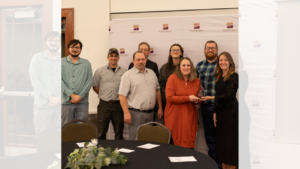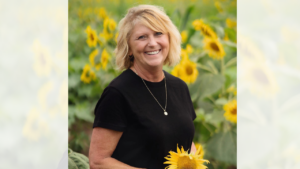“I am a mom of four. I was a young mom and then I became an older mom. I had my first two children at ages 21 and 22. Even though I was an educated woman, and I had a great support system, it was a little scary and overwhelming.”
That’s Dana Neemann, Nurse Director of Education at CCMH.
“January is Maternal Health Month. And I think when you’re talking about maternal health we need to understand that the health risks to women are much the same both during pregnancy and post-partum. With the constant advancements in medicine and better access to health care, researchers are finding out a woman is at risk for postpartum complications up to about a year after delivery. Some of those risks include high or low blood pressure, mental health, bleeding and swelling.”
Neemann, who was a hospital and obstetrics nurse before assuming her current role in patient and community education, says pregnancy and post-pregnancy are critical times for women and their health.
“When you’re pregnant, a woman’s body gives all the nutrients to that little baby. It takes away from what the mom in receiving and can affect your dental and visual health and any number of other issues. That’s why prenatal care is equally important to both mom and baby. There are several of screening tools that can help identify if there are any health issues for mom that may need to be addressed during and after pregnancy.”
Neemann is a big believer in making sure women have the top-notch information to make the best healthcare decisions.
“Over the last few years, one of the biggest takeaways has been reliable sources of information. We’re a very digital social media savvy society, but we also have to remember some of the health information that we’re seeing on social media is not reliable. If you are a woman of childbearing age, and you have questions, you need to have conversations with a trusted healthcare provider. Otherwise, use trusted, evidence-based research sites such as Iowa Department of Health and Human Services. You can go to the Centers for Disease Control (CDC) as well. There are a lot of health initiatives out there.”
For pregnant, low-income women, Neemann recommends Every Step Care and Support Services program from the state of Iowa.
“This is one program targeted towards women in all 99 counties in Iowa, primarily for those who are either Medicaid eligible or have a lower income. Sometimes, it’s women who make too much money for Medicaid, but their private insurance doesn’t cover much. Every Step Care and Support Services program really focuses on providing resources from the time prior to getting pregnant, during pregnancy and then, postpartum.”
Neemann notes women are their own best advocates when it comes to healthcare.
“Every person knows their own body best. After pregnancy, because of hormonal change and psychological adjustments, it does take a while to get back to your baseline health. I suggest women be mindful of how they respond to stress. Pregnancy is stressful. Postpartum recovery is stressful. What’s really important is to pay attention to those preventative measures to help screen for potential complications.”
The primary care provider is an important partner for women in maternal health.
“Amid all of life’s struggles, we can’t ignore the red flags we see in our daily health. Women need to be able to discuss these questions with their primary care provider. Maintaining regular appointments and following up when your health seems off-kilter can help prevent risks for both infant and maternal mortality. In my own instance, even though I had a great support system, I experienced feelings of guilt, frustration, being overwhelmed, being unsure of myself. You are not alone. Have those conversations with your provider. Sometimes those feelings can actually be due to a metabolic problem or a hormonal imbalance.”
Neemann’s final advice for women is to take their health seriously.
“When I had my first two young kids, I was always nervous about bringing them to the ER. I was unsure about bringing myself to the ER. Oddly enough, if it’s 2 am, the ER is the most appropriate place to go, especially in rural Iowa. My advice – when in doubt, get help. There are any number of places where women can participate in prenatal classes. This is one of the best ways to identify the health issues you and your baby may encounter during pregnancy. It’s also an opportunity to ask questions, get valuable information, and know where to go and who to call when you need help.”
Neemann encourages women who are in need of prenatal or postnatal care, and do not have a primary care provider, to contact the CCMH Medical Clinic at 712-265-2700 or to go online at ccmhia.com to request an appointment.


